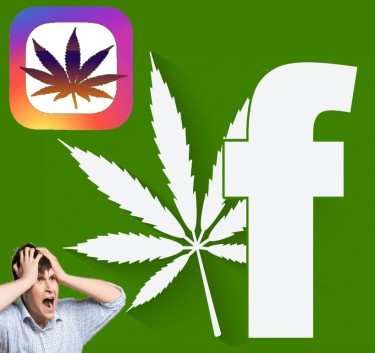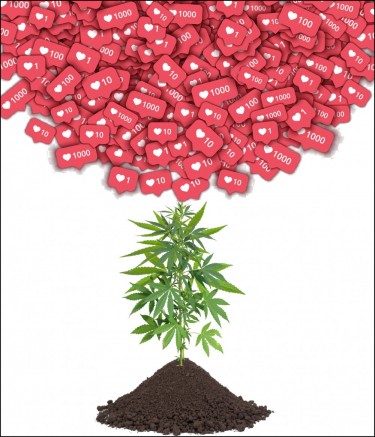
Is Pinterest Weed Friendly Or Do They Ban Cannabis Companies?
Social media has always had an awkward relationship with allowing cannabis companies to promote their products on their platform. This has led to a number of issues and issues as some marijuana companies have been intentionally banned on their platform. The focus of this article is Pinterest as a social network and its policies towards marijuana businesses. We’ll also answer the question of whether Pinterest bans marijuana businesses in the shade.
Mainstream social networks like Facebook and Twitter are known for their unsavory policies towards cannabis companies. These platforms are filled with various types of misinformation about the cannabis industry and its companies. It’s understandable, therefore, that their policy isn’t welcoming of cannabis companies either. However, many cannabis companies seemed to find solace in a less strict platform in Pinterest, or so it seemed
Pinterest is a lifestyle-focused social network and most of its users post images and videos to enable interaction with others. Although 85% of users are women, the network is usually filled with topics revolving around baking, fashion and decoration. Nonetheless, Pinterest is very effective as it competed with Facebook as a sharing medium in 2013. Well, Pinterest has evolved since its inception, becoming more diverse and versatile. The presence of more men on the platform gave way for more topics to be discussed and a different set of materials to be shared.
Raising awareness about cannabis products has always been a big problem, even outside of social media. However, social media has always had a special appeal as it can easily provide access to the target customers. Organic content on social media has always been the golden jewel in helping cannabis companies reach their audiences. Because with the right keyword usage, a simple search engine search leads the user to the product.
When it comes to effective social media marketing these days, algorithms seem to have taken the place of organic content. This has prompted most businesses to go down the paid advertising route in order to be able to attract targeted customers. Unfortunately, this doesn’t help cannabis companies as they are still considered illegal under federal law. While it’s true that these companies are legal in the states in which they operate, that’s still not enough.
The strictness of regulation on most social networks leaves most cannabis companies no room to breathe. Talking about weed is a violation, as is promoting it on some networks. Penalties like having your account banned or having your posts removed are common in such communities. This therefore creates a tough condition that is almost insurmountable for most cannabis companies. However, it seems that cannabis companies may have found room to squirm with Pinterest’s vague marijuana policy. Because of this, there’s a lot of attention paid to whether or not Pinterest bans marijuana businesses in the shadows.
Different social networks have different controlled substance policies, but we’ll be watching Pinterest closely. In its policies, the company states that it is not a place where regulated goods, products and substances can be traded or sold. This also applies to products that can cause damage after being irresponsibly modified, used or manufactured. The community also expressly states that it restricts and removes the distribution of content that promotes the commercial sale of marijuana products. As simple as this may seem, it is still very vague and various parts are open to interpretation.
A number of cannabis companies believe there are ways around these guidelines and are asking questions. Does sharing a picture of a cannabis leaf, cannabis product or dispensary count as an offer or an attempt to circumvent regulations? Is an ancillary business operating in a legal cannabis space in products such as packaging or lighting classified as paraphernalia? Is a company involved in hemp subject to the same standards that cannabis companies are subject to? These and many more are the questions cannabis companies ask themselves and believe will be useful to make their claim.
As for whether Pinterest is a shadow ban for cannabis companies, the guidelines already speak for themselves. If the cannabis industry has learned one thing, though, it’s that rules are subject to change and are subjective. Shadow banning is a common technique used by social media platforms to monitor cannabis companies. It is also known by other terms like comment ghosting, stealth banning or ghost banning. It is a special tactic that ensures that new users do not find your website or page on a social network. However, this does not stop your followers from finding your business.
The goal of shadow banning is to frustrate the site owner until they stop gaining new followers. Since cannabis companies can’t pay for paid advertising and organic content doesn’t drive traffic, they will eventually become frustrated. After that, such companies can only appeal against bans and hope that the companies will restore their visibility. This means that all power here belongs to the social media networks. As such, it’s important for cannabis companies to know how to thread the waters down this avenue.
Since organic content will certainly be banned and paid advertising not possible, cannabis companies can only rely on other means. The popular alternative will be using influencer or affiliate marketing, or using educational blog posts. Until the federal ban changes, this is the reality cannabis companies must face and live with. It is very certain that mainstream advertising for cannabis companies will be impossible for now. As such, cannabis companies need to find new and innovative ways to make the most of what they currently have.
SOCIAL MEDIA AND CANNABIS, READ MORE…

IS FACEBOOK AND INSTAGRAM HOLDING BACK CANNABIS REFORM?
OR..

CAN CANNABIS BUSINESSES GET FOLLOWERS ON INSTAGRAM?

Post a comment: